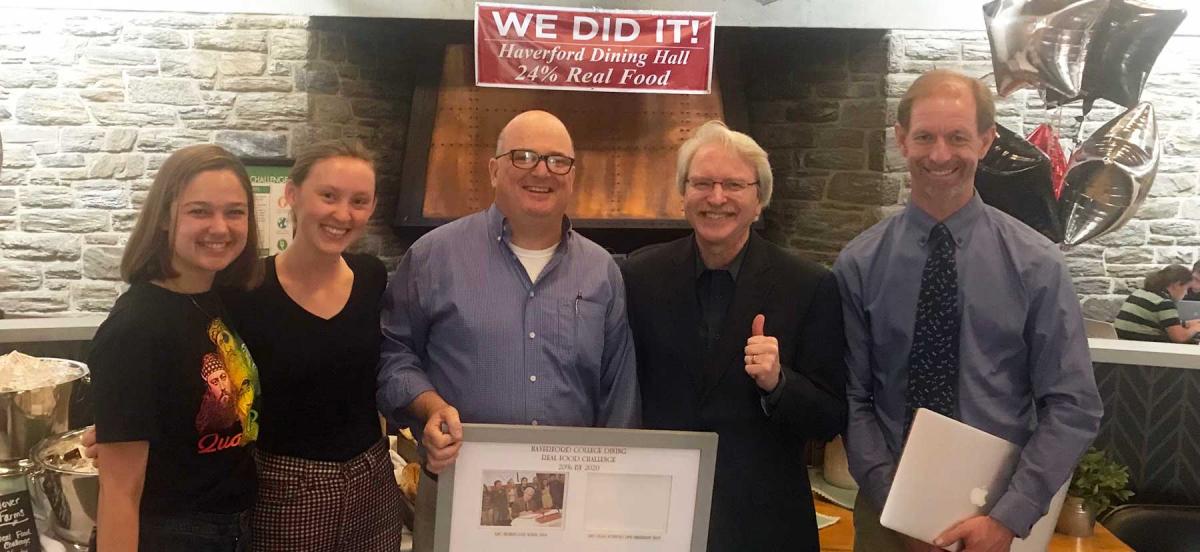Haverford College Meets Real Food Challenge Goal

Sophie Schleifer '22, Sophie Drew '19, General Manager of Dining Services Thomas Mitchell, President Kim Benston, and Chief of Staff and Chief Sustainability Officer Jesse Lytle at the Dining Center's Real Food Challenge Celebration.
Details
The College, which pledged to devote at least 20% of its dining budget to local, ethically sourced food by 2020 following a 2016 Plenary resolution, surpassed that ambition 10 months ahead of schedule.
Back in February 2016 members of ETHOS, Haverford’s student food-activism group, worked to propose and pass a “Good Food” resolution at Spring Plenary. That resolution—inspired by training with the Real Food Challenge (RFC), a program that advocates for more ethical food purchases in higher education—asked the College to shift the Dining Services budget for local, sustainable, fairly and humanely produced food from 8% to 20% by the year 2020. After accepting the Plenary resolution, President Kim Benston also signed the Real Food Campus Commitment, making Haverford one of only 43 colleges and universities that has pledged to reach that goal by 2020.
But despite the ambitious scope of the challenge, the campus not only met its target 10 months early, it surpassed it. As of February 2019, Dining Services was spending 24% of its budget on “real food”—defined as food that nourishes producers, consumers, communities, and the earth by meeting certain quantifiable standards set by the RFC.
“It's enormously gratifying to have met the RFC goals in a relatively brief period,” said President Benston. “This effort demonstrates the Haverford community's lived commitment to mitigating the ravages of an unjust and unhealthy food system by making dining choices that are thoughtful, constructive, and ethical.”
Changes could be enacted relatively quickly due to an important partnership between the student body and Dining Services, particularly via a new Food Systems Working Group, a team of students and administrators focused on sustainable food sourcing on campus. The group, which was led this year by Sophie Drew ’19 and includes Dining Services Executive Director Bernie Chung-Templeton and General Manager Tom Mitchell, meets weekly to discuss purchasing and new vendors, and to set and calculate RFC goals.
“It was a pretty simple strategy: we identified the products that the Dining Center spends the most money on and looked for alternatives that qualified [for the RFC],” said Drew. “Tom has been very supportive of the challenge since he started here and… with his help we found [local vendors] Morabito Baking Company, FreeBird Chicken, and Clover Dairy. Those were the major shifts that got us to our goal.”
While the strategy might have been simple, making the numbers work was not always easy, since the sometimes-higher price of “real food” required students to make trade-offs across the dining menu. For his part, Mitchell feels “the unsung heroes of the RFC are the students. They were the driving force, led by Sophie Drew and her team. From calculating invoices, creating marketing materials, qualifying venders, researching products, and meeting with the kitchen staff and me through the process—this is what made the 24% possible.”
Haverford’s participation in the RFC isn’t just about percentages and numbers and goals, though. It’s about living the College’s values in every aspect of its operation, and finding a framework to encourage measurable change.
“The Real Food Challenge helped the dining program clarify its values around food sourcing in such a way that priorities around local, sustainable, healthy food are explicitly weighed in every purchasing decision,” said the President’s Chief of Staff and Chief Sustainability Officer Jesse Lytle.
In addition to new vendors, the Dining Center now offers a RFC station at every meal, which showcases rotating local, organic fare. (Mitchell says the chicken fingers and salmon are most popular.) And the best part is now that the new RFC-qualifying vendors and items have been identified, the 24% is viable and continuable. Or to put it another way, this is one sustainability goal that is, itself, sustainable.
“For anyone, but especially a college student, food is one part of life where one is empowered—at every single meal—to consider what's sustainable for our society, and to make decisions that have a real and meaningful impact on the world,” said Lytle. “An individual's diet accounts for up to 60% of their carbon footprint, so the implications go way beyond personal health and the ethics of food sourcing. It would not be an overstatement to say that the future of the planet hinges in large part on what we put on our plates.”



